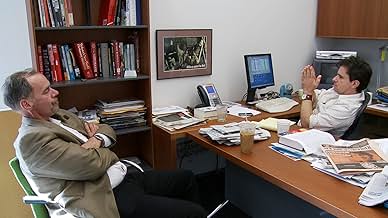Unprecedented access to the New York Times newsroom yields a complex view of the transformation of a media landscape fraught with both peril and opportunity.Unprecedented access to the New York Times newsroom yields a complex view of the transformation of a media landscape fraught with both peril and opportunity.Unprecedented access to the New York Times newsroom yields a complex view of the transformation of a media landscape fraught with both peril and opportunity.
- Awards
- 3 wins & 10 nominations total
- Director
- Writers
- All cast & crew
- Production, box office & more at IMDbPro
Featured reviews
Without a doubt, the NYT has had its problems (like Judith Miller's pushing the WMD claims about Iraq, and Jayson Blair's outright falsification of stories), but it remains an important source of information. In years past the Internet was not widespread, so it was through newspapers that Watergate and the Pentagon Papers got exposed. All of which shows the importance of having an informed population. All in all, this documentary is a really good look at the inner workings of the news business. I recommend it. Among the other interviewees are executive editor Bill Keller, and Baghdad bureau chief Tim Arango.
Newspapers – and especially the elite newspapers – remain a crucial element in our political culture in that they provide a check against abuse of power by both government and corporations. The internet new media still relies on old media for its reporting and is not equipped to replace it. Clearly new models for cooperation between new and old are needed that will allow mainstream media to continue to profitable. The NY Times is proud, magisterial, occasionally arrogant, and absolutely necessary. Like any old institution, it will survive if it continues to change and evolve for new times and technologies.
Page One is part of an on-going conversation that the United States is having about how media will evolve in the age of the Internet. It is useful film for engaging the broader public in the conversation.
But the movie's at its best when it's about the newsroom, and this is compelling stuff: decisions being made during the Wikileaks info dump, Iraq withdrawal, and the laying off o a great deal of the paper's workforce. You do get to be a fly on the wall, and during these scenes, it's good stuff.
7/10
Too bad for the film's audience though, David Carr comes across as more of an a**hole for most of the film and you welcome to other locales and issues the documentary focuses on when it's not on Carr. There are scenes of employee layoffs, contrite apologies about Judith Miller and Jayson Blair, and the continuing defense that without the large, networked mainstream media, these new social media / news aggregator sites would have nothing to link to on their websites. These professional at-home bloggers do not have bureaus in Baghdad, stringers in war zones, and in an amusing side bit, they do not have people following their hometown zoning boards either.
Page One is effective at showing the audience that hardcopy newspapers are not dead yet and they still provide a considerable service to those who wish to remain informed. Regrettably, the film spends way too much time on David Carr and the media section which bogs down the film and makes the audience wait for the next segment not involving Carr.
Did you know
- Quotes
Shane Smith: I'm a regular guy and I go to these places and I go, "OK, everyone talked to me about cannibalism, right? Everyone talked about cannibalism." Now I'm getting a lot of shit for talking about cannibalism. Whatever. Everyone talked to me about cannibalism! That's fucking crazy! So the actual... our audience goes, 'That's fucking insane, like, that's nuts!' The New York Times, meanwhile, is writing about surfing, and I'm sitting there going like, 'You know what? I'm not going to talk about surfing, I'm going to talk about cannibalism, because that fucks me up.'
David Carr: Just a sec. Time out. Before you ever went there, we've had reporters there reporting on genocide after genocide. Just because you put on a fucking safari helmet and looked at some poop doesn't give you the right to insult what we do. So, continue.
- ConnectionsFeatured in De wereld draait door: Episode #6.173 (2011)
- SoundtracksLost in Detroit
Written and performed by Rolfe Kent
From the motion picture In the Air (2009)
Courtesy of Paramount Pictures
Details
- Release date
- Country of origin
- Official sites
- Language
- Also known as
- Page One: Inside the New York Times
- Production companies
- See more company credits at IMDbPro
Box office
- Gross US & Canada
- $1,067,028
- Opening weekend US & Canada
- $28,911
- Jun 19, 2011
- Gross worldwide
- $1,077,982
- Runtime
- 1h 32m(92 min)
- Color
- Sound mix


















